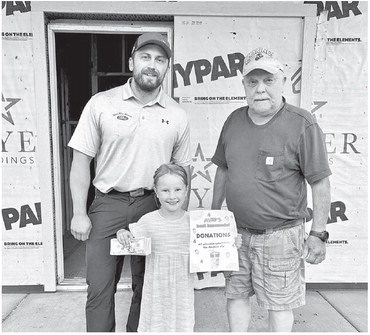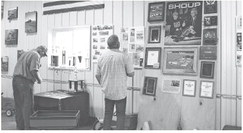City sets up non lapsing fund for office equipment
Recognizing that things tend to break down when they are most needed, city clerk Ashley Lemke asked the council to make a city hall equipment fund non lapsing.
Historically, the city had set an annual budget for equipment replacement which includes computers, printers and copiers used at the city hall. During the committee of the whole portion of Monday’s council meeting, Lemke explained that in most years the money is not spent and instead is added to city reserves.
According to Lemke, the concern is that multiple pieces of equipment will go at once and leave the city scrambling. Instead, she asked that they be able to build up a reserve so that the money is on hand to replace highticket items as needed.
“When they go down, they go down,” Lemke said, noting that it seems to happen when they are most needed.
Council member Laura Holmes asked if the city was on a regular replacement schedule. Lemke replied that they run equipment until it no longer works and that there is no set timeline for upgrades to take place.
She said the city has had service contracts with outside vendors for such things as copier maintenance and said those ended up not being a good deal for the city.
Committee members voted unanimously to recommend having the budget line item become nonlapsing. The intent, said city coordinator Joe Harris, is to budget the same for it as it has been in the past.
In other committee of the whole action, members:
• Recommended approval of a 28 cent increase per month for refuse and recycling, passing on the cost increases from the city’s vendor.
• Received an update on the planned sewer connection to the village of Stetsonville that could take place in 2027. Treatment plant superintendent Alex Zenner said there are no concerns with the capacity of the plant and that they would turn away trucked in waste from other places if the load increased in the city.
During the city council portion of the meeting, members:
• Received the annual audit report for the end of 2024. The city received a clean audit with an “unmodified opinion.” “This is what they hope to achieve,” said auditor Jon Trautman of CliftonLarsonAllen LLP. He noted that the city is in a good position, explaining that they look at fund balances as a way to compare the financial health of municipalities. He said Medford has sufficient fund balances to deal with issues that come up without having to incur the cost of borrowing.
• Approved the fair housing ordinance language required in order to qualify for community development block grant funds. The language does not change anything the city already had in place and is done to fulfill the grant requirements.
• Approved a wage increase for department heads of $2.50 per hour beginning in October 2025 and another $2.50 per hour increase for them on January 1, 2026. Harris said he felt the department heads are deserving of the raise.
“Yes, I agree we have wonderful department heads, but that is not what I think this is about,” Bub said. He said he would prefer if the city would phase in the wage increase. He said in at least one case, the city is giving someone a 25% raise. “I think that is steep,” he said.
Harris defended the department heads and said that for the job they are doing, they are worth the higher pay. Harris said he was wiling to give up his own raise in exchange for others getting them because he felt that the department heads deserved the increase. “I admire your willingness to do that,” Bub said, noting that the discussion on and Harris’ offer had taken place in closed session, expressing that he felt it should have been more in the open. In the end, the increases passed 7-1 with Bub opposed.
• Approved amending the contract with Short Elliot Hendrickson to provide additional day-to-day oversight, particularly the underground portions of the wastewater treatment plan upgrades, at a cost of $204,300. Plant superintendent Alex Zenner said he simply is not able to do the construction oversight and his other duties at the same time and while above ground work can be checked on after hours, once the work is buried it is hard to check on it.
• Approved buying a new 2025 zero turn lawnmower from Lang Equipment at a cost of $13,080.90. The city will be selling the current lawnmower through Wisconsin Surplus Auction with the money generated to go back into the equipment replacement account.
• Reviewed the breakdown of how hotel/motel room tax money is allocated with 14% retained by the city, 2% earmarked for bands in the concert series and the remainder being allocated to groups through room tax grant requests. When asked what the city does with its portion of the room tax funds, Harris said that with the donations received from the community it covers the cost of fireworks for the 4th of July. “That is what we use it for,” he said.
• Reviewed the budgets for the city’s enterprise finds and tax incremental districts. These include the water, sewer and electric utilities, as well as the refuse and recycling and other funds which primarily generate revenue through user fees. Across the board, the utilities are operating in the black with money set aside for deprecation of assets being the primary means of having cash on hand for system upgrades and improvements. When reviewing the wastewater utility budget, Zenner noted that hauled in waste, include the sludge and leachate from industrial sources, is a growing part of the budget with it expected to be about half of the revenue for the plant in the coming year. He noted in the past year the revenue from this area has increased by $400,000 however, he noted there is increased electricity purchase as a result of about $4,000 as well as some other chemical price increases, due to regulatory changes.



